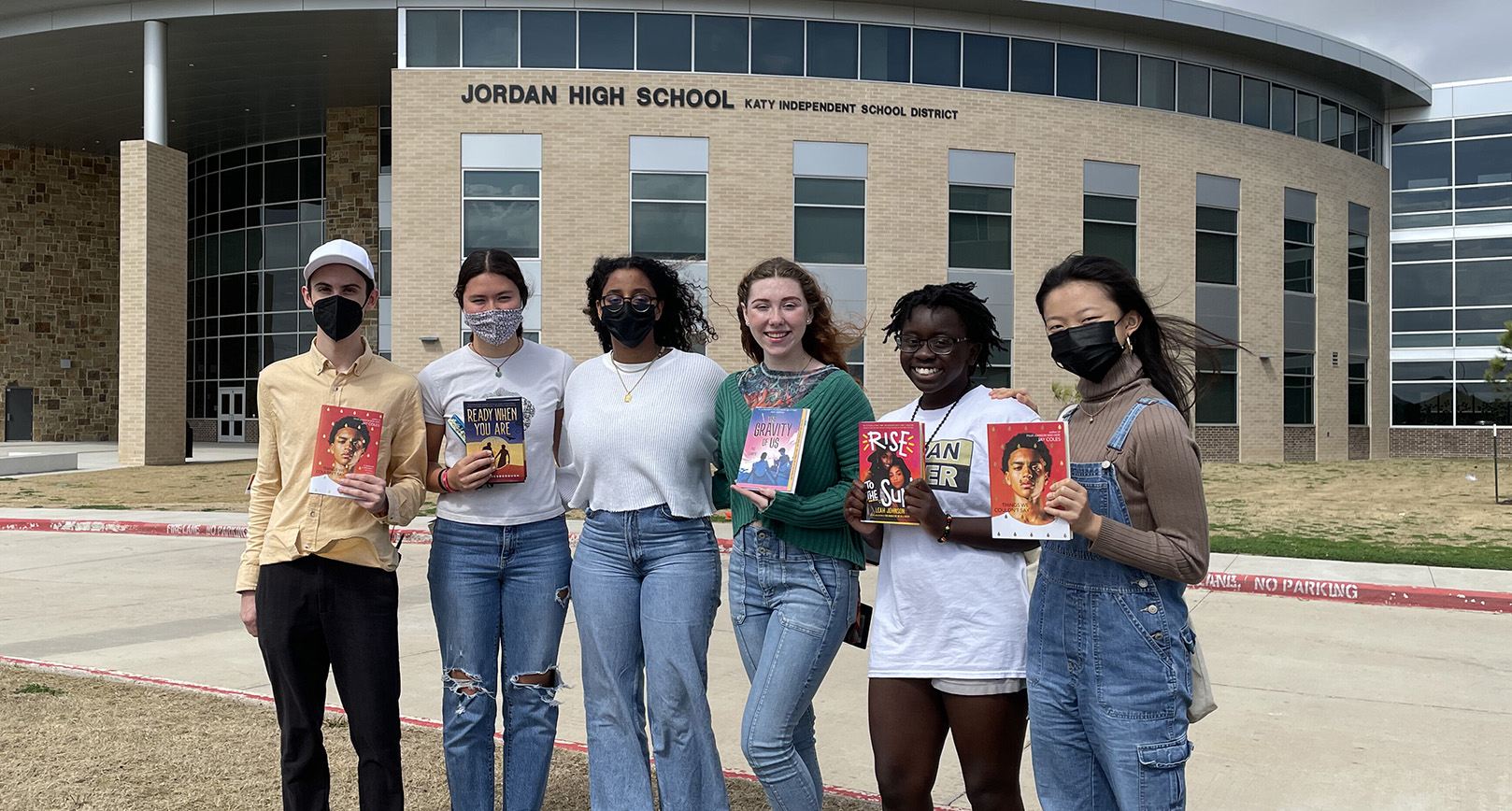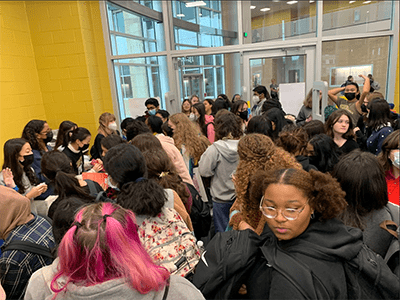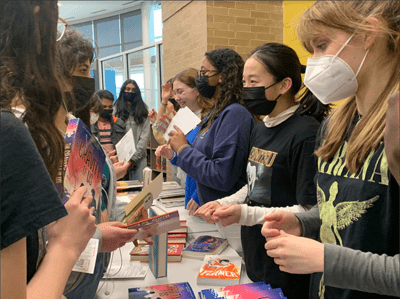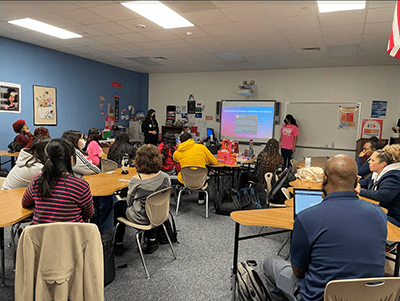
In the past year, the Texas state government has put schools under pressure. From what is discussed in classrooms with House Bill 3979, which passed at the end of May last year, to scrutinizing books that are in school libraries according to a list of 850 titles created by Republican State Representative Matt Krause. Originally proposed as an “inventory” these books have been targeted for pulling and banning by many districts in Texas, including Katy ISD, where Cameron Samuels (they/them) is a student (Pictured far left in the yellow shirt and white hat).
In response to these various difficulties, Samuels and other students in KISD partnered with Katy4Justice and Voters of Tomorrow to create an initiative that would distribute these threatened books directly to teens in their district. Below Samuels provides more insight into this process, as well as their experience and thoughts around advocating for the right students have in choosing what they read.
Logan (they/them): Logan here with Cameron from Katy4Justice, and today we're going to be talking about their initiative within their school. Cameron, could you introduce yourself and tell us a little bit more about Katy4Justice?
Cameron (they/them): Hello, I'm Cameron Samuels. I use they/them pronouns, and I am a student in Katy ISD where I've been in working with Katy4Justice and Voters of Tomorrow on efforts to distribute hundreds of books to students across the district.
The books that we are distributing have been targeted in school districts across the state of Texas and by policymakers in the state legislature. These books touch upon issues of race and LGBTQ+ identities, and it's no doubt that those are the reasons that these books are being challenged.
Logan: So has it been successful so far? Could you tell us a little bit more about the process?
Cameron: We engage student organizers in this process of putting together these distributions at afterschool club meetings- so students across seven high schools were engaged in these advocacy efforts to work with these clubs and prepare for these distributions. We had our FReadom Week, that's what we coined this effort to distribute these books.
We got books donated from Voters of Tomorrow and from publishers who have provided these books for us. Hundreds of books, it's quite amazing! We distributed them to more than 170 students during our FReadom Week. And it was amazing to see the impact that we made and the power that we built through these efforts.
Logan: That's so exciting to hear! I'm a mobile outreach librarian, so my job is similar in that I go out to underserved communities with another team of librarians, and we do literacy programs and pass out free books to kids. So I definitely understand that side of it and can definitely relate to that. What are some of the reactions you've been getting both from the students you've been distributing from and maybe outside reactions?
Cameron: When we announced these efforts, students, including the organizers, were so excited to receive books that touched upon these issues and included these subject matters because this literature represents students. They provide stories and everyday experiences that are in our lives. This affirmation supports us in becoming who we are, especially when these books are touching upon LGBTQ+ identities and include storylines without tokenization. These stories have perfect representations that students need to grow and become the person that they are if they're struggling with that.
Students have really adored the books that we had in our selection for distribution. It was really nice to see them thoroughly benefit from this. Some have said these books were on their reading list and they were going to get them, so they were so glad to have them on hand now. It was really great! But the unfortunate part is that we have had some opposition- parents in the community, even community members that aren't even parents, but are possibly grandparents or may not even have children in the district, they have given us a difficult time in these efforts.
We've had some opposition through that at school board meetings and during our FReadom week, but we pushed through nevertheless. We ended up packing the school board meeting following our distributions where almost every seat was filled with students and supporters of the Queer and BIPOC community. And we outnumbered the opposition for the first time this year, or ever, to my knowledge.
Logan: That is so thrilling! As a librarian and a former educator, I have a lot of frustration when things like this happen. Seeing such an active and passionate group of students who want to fight against this kind of inequity is so exciting and inspiring and it gives me a lot of hope. It's been amazing to learn more about this whole organization! Have you been able to read any of the books that you've been distributing?
Cameron: I have been able to read several of the books, despite the fact that this organizing takes so much time and effort. With the number of books that we have distributed, it's so much for just one person to read in a short amount of time, so that did require all of us to do thorough research on these books ahead of time. Many of these books were read by the student organizers across the different schools. So we had background knowledge, but also actual people who have read these books and could speak to their value and understand that the calls to censor these books are totally blown out of proportion. From reading some of these books prior to our distributions, but also reading some now afterward, I have come to that same conclusion.
These books provide so much value to students and the claims that these books harm us and they need to be censored, it's totally blown out of proportion. Just the fact that snippets can be taken out of these books, out of context, and used to judge the entire book or even a collection of, say, 850 books in total. Judging a couple that is vulnerable to criticism, to say that the entire list of books has to be banned and students cannot read these books, that's really disturbing to see. As students, we have to take ownership of our education and not let others decide for us what we can and cannot read. We learn from a young age about self-censorship. If a book offends us, don't read it. We've learned from librarians since we were young about the idea of self [regulation], and it's really harmful to see this concerning wave of censorship grow, spread like a wildfire, and target these books that provide so much value. They’re already not readily accessible, but now they're virtually impossible to gain access to.
One book that I have read from our distributions is Flamer by Mike Curato. We actually had an author visit with him a couple of days ago, and he is just a great person. His book has so much value in it, especially to me as someone who could share a similar experience to the protagonist. I saw myself in that book- in the same shoes. I cried after reading that book. That book really moved me, and I can't see how that book could be blown out of proportion as much as it was, and is currently being challenged in school districts across Texas. I can't come to an understanding of what that's going to do to students who may share similar experiences to the protagonist and me. The bottom line is that Flamer provides so much value. Books like it, that students can see themselves in, provide value to them. There's a quote on the cover of Flamer that says this book will save lives- I agree wholeheartedly with that statement. I know for other books, including that one, the same will happen if students see themselves, and that's why these books are so necessary.
“This book will save lives."
—Jarrett J. Krosoczka, author of National Book Award Finalist Hey, Kiddo, speaking on Flamer
Logan: Thank you so much for sharing that personal anecdote. It's so amazing to also hear about how authors are connecting with you all and are supporting you in that way, especially whenever you get to talk to an author whose work touched you so much. Along that line, what do you want folks who maybe aren't familiar with what's happening to consider about these books?
Cameron: These books provide value to students and we can't let others decide what we think about these books. We can't let them make these false claims and use fear tactics to prevent us from reading these books and discourage us from reading them on our own. That's why we have to not take their words for truth because they are not. We have to read these books ourselves and understand the value that they provide. Because you will find that value in these books. So we have to read these books and come to our own understanding about the content that it includes. And when we do that, we will see that these books do not have content that is harmful to students, but quite the opposite.
It's been really infuriating to me to read these books and know that they're being challenged for certain reasons. And I'm thinking to myself, “Why? Why are these books being banned? How can someone make these claims?” And the truth is, these books are being targeted because they challenge the notions of white supremacy and a heteronormative society. And when someone disagrees with the subject matters in these books, they make these claims out of fear and target certain things in these books that typically are totally normal to have in a book. Conflict is typical in a book, and they're able to use that out of context and make their claims and support their agenda of upholding this unjust status quo that keeps us struggling each and every day.
Logan: Yes and I think people who are outside of that understanding really need to hear that. Like you've been saying, we need to trust students to be discerning in the decisions they're making with what they read. To me, it's very evident that your efforts with Katy4Justice demonstrate how young people do not want to blindly follow those kinds of overarching and unfair decisions. You being so forward and sure of everything that's happening because you are going through it and because the people around you are going through these things should be taken very seriously. It's very frustrating as somebody who was an educator and is involved with education in general, that these efforts aren't acknowledged. I'm incredibly happy that I get to talk to you and be able to lift you all up because you definitely deserve it.
Was there anything else that you wanted to say? Also, how can readers support you and Katy4Justice?
Cameron: There are two things that I want to mention about censorship in Katy ISD which is most likely also taking place in several other districts. One is that Katy ISD sends out a notification to parents when a student checks out a young adult fiction novel.
[Logan makes a shocked expression because this is completely out of line in terms of the American Library Association’s values and privacy guidelines]
Cameron: Exactly! That reaction is exactly the same reaction that so many students have had when we inform them at book distributions.
The American Library Association is the “oldest and largest library association in the world. The ALA sets much of the precedent and guidelines for American libraries. The ALA “strongly condemns acts of censorship and intimidation. We are committed to defending the constitutional rights of all individuals, of all ages, to use the resources and services of libraries.” Additionally, ALA's stance on patron privacy and the kind of monitoring Katy ISD has implemented is clear:
“The right to privacy includes the right to open inquiry without having the subject of one’s interest examined or scrutinized by others, in person or online. Confidentiality exists when a library is in possession of personally identifiable information about its users and keeps that information private on their behalf. Article III of the Code of Ethics of the American Library Association states that confidentiality extends to 'information sought or received and resources consulted, borrowed, acquired or transmitted,' including, but not limited to, reference questions and interviews, circulation records, digital transactions and queries, as well as records regarding the use of library resources, services, programs, or facilities.”
ALA on Privacy | Privacy: An Interpretation of the Library Bill of Rights ALA (amended 2019) | Library Bill of Rights
Logan: Oh my gosh, that's completely against library values, I'm so shocked by that.
Cameron: It most definitely is. Roughly half the students at our distributions knew about that and the other half did not. For those who were aware, it obviously deters students away from checking out LGBTQ+ novels, which are going to be under that young adult fiction category. It's going to deter students from seeking the support that they desperately need. And for those who were unaware of this notification, what would have happened if they checked out one of these books and a notification was sent to their parents? That notification could change their life forever, permanently, with no return. That's going to cause so much harm for them. This policy to notify parents of these books is so harmful and so surprising because it does not fall in line with what a library is supposed to provide.
Logan: Yes, libraries are meant to be safe spaces for everyone and uphold a patron's privacy. Librarians are not supposed to do something like that. It is incredibly frustrating to hear that. At the same time, it just raises more questions, because what happens whenever a student checks out a classic novel or literature that may have content that is similar or deemed worse than what would be in a young adult novel? Further, young adult novels are written with young adults in mind, so there isn't going to be anything that, you know, somebody who is a teen couldn't handle or wouldn't be able to understand. That's completely absurd.
Cameron: Students already see what's in these novels every single day at school- they might see even more. These experiences are common in their lives and closing off literature that can help them navigate through this [could be damaging]. Possibly it causes a challenge for them, possibly it could make them uncomfortable, or possibly it's just something that they align with. And it's unrelated, but these novels provide resources, and in that, it supports their development and their navigation through this changing part of their life where they're growing and they're becoming a new person who's having to navigate the real world.
Closing off this access to stories and experiences that can prepare them and provide comfort or resources to support them- it's really unfortunate to see and just I can't wrap my head around it. There's this double standard where, like you said with novels, classics that could have content could be criticized but are not for the same content that is taking place in these banned books that touch upon race and LGBTQ+ identities. Those subject matters are criticized, whereas heteronormative love and white-centered stories of classics are not challenged in the modern-day - this double standard is really frustrating to see for sure.
Logan: And there are also things that are considered literary canon that are dated and ill-informed in terms of LGBTQ+ issues and race. These should still be acknowledged, but also criticized and challenged because of current understandings of marginalization and intersectionality. Along with this, new novels that are more contemporary and relevant to what is happening now deserve a platform and deserve to be read. That whole situation just seems to threaten these ideas in and of itself. Honestly, the fact that your district has a policy like that is an invasion of privacy. How can we better support your organization and your efforts?
Cameron: There are school board meetings where students especially are underrepresented. If we can have students not only attend but speak at school board meetings in their local districts, then policymakers and decision-makers of the policy that directly impacts students will see that students are standing up and hopefully that can influence the decisions that they make. That is one very important action that must be taken because it has not been that consistently over months.
There haven’t been any students at school board meetings in many districts in KISD. At most of the meetings, there have been no students or I've been the only student. It's also very important to develop one's understanding of censorship and read banned books, read books that are being challenged, and see for yourself that these books are not what they say they are because we cannot trust others to tell us what their content is if we haven't read them for ourselves.
Another part of staying involved and developing your understanding is becoming active- standing or sitting on the sidelines is not going to move or influence policymakers one way or the other. This bystanding only confirms these decisions and makes people challenging these books and the privacy & education of students to believe that they're doing something in the interest of their community.
Logan: Right. And I think to add to that, a lot of students especially don't realize that they can go to school board meetings, in fact, anyone from the community can go to these meetings. Just because it’s called “the school board” doesn't mean that you can't go. The original reason the school board meetings were set up was so communities could all come together and discuss things that would support schools and thus support everyone.
Cameron: Absolutely.
Logan: Thank you very much again for taking the time to speak with me. I hope that the rest of the school year goes very well for you. And I'm thrilled and so excited to keep an eye on what y'all are doing.
Cameron: Thank you so much for the invitation to this discussion, and I really appreciate it.
Since this interview, Cameron informed me that Flamer, Maus, and Beloved were reviewed and restricted to high school, junior high and up, and 11-12th grade, respectively. They also stated the following: "Although all censorship is disturbing, we are viewing the decision on Maus a success as a result of us outnumbering the opposition at a second school board meeting, the one in March! We have distributed 600+ books to this day, and we are soon to distribute more than 700 total. The board of trustees election is in full swing, and book banning has taken the center stage."
It seems continued efforts against censorship in Katy will continue, but uplifting students like Cameron, supporting organizations like Katy4Justice & Voters of Tomorrow, as well as participating in School Board meetings and elections can ensure students' rights to choose what they read and express themselves fully and safely. If you know a young person in the LGBTQ+ community experiencing stress or hardship, check out the Trevor Project. The Trevor Project is an organization that provides crisis counseling for LGBTQ+ youth. They also have resources about topics such as the diverse range of sexualities and gender identities, as well as guides on how to help folks experiencing stress and discrimination related to their identities.
References:
- Katy ISD board election results: Perez ousts incumbent, Redmon re-elected to second term by Claire Goodman
- About Page for The Trevor Project
Further reading:
- The Texas Tribune: Texas students push back against book bans for censoring LGBTQ, racial justice issues
- The Law that Prompted a School Administrator to call for an "Opposing" Perspective on the Holocaust is Causing Confusion Across Texas
- Texas Education Agency’s Breakdown of HB3979 and Updates made by Senate Bill 3 (TEC, §28.0022)
This blog was written by Logan T. and first appeared May 2022.






Add a comment to: Fighting for Privacy and Against Censorship: Interview with Cameron Samuels